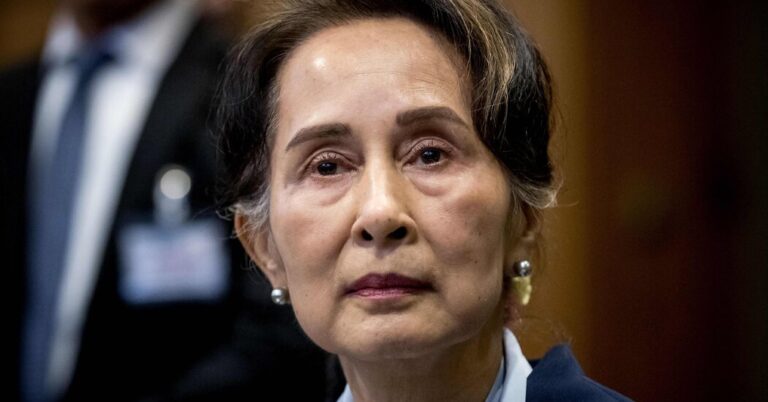Myanmar’s deposed civilian leader, Daw Aung San Suu Kyi, has been transferred by the military junta to an undisclosed location from a prison in the capital, Naypyidaw, raising questions about her safety.
Ms Aung San Suu Kyi and U Win Myint, the country’s former president, were transferred “to a safe place due to high temperatures in the prison”, Zaw Min Tun, the military spokesman, said on Wednesday, without revealing their location. Temperatures in Naypyidaw reached 114.8 degrees Fahrenheit, or 46 degrees Celsius, last week.
Few people in Myanmar believe the military genuinely cares about Ms Aung San Suu Kyi’s well-being.
The unexpected move by Ms Aung San Suu Kyi, 78, comes as the military is under intense pressure from a rebel alliance. In recent months, he has suffered its worst losses Since seize power in a coup d’état in 2021.
Ms Aung San Suu Kyi, who was deposed in the coup and is still widely revered in the country, is serving a prison sentence. 27 year sentence on corruption and other accusations. Human rights groups and their supporters say the charges were fabricated and aimed to prevent the Nobel Peace Prize winner from holding elected office. Kim Aris, Ms Aung San Suu Kyi’s younger son, said he believed the junta could use his mother as a potential “bargaining chip”.
“As the fighting gets closer” to the capital, he said, “they become more and more desperate and try to put in place measures that might protect them a little bit.”
Mr. Aris, speaking by telephone from his home in London, said he received a brief letter from his mother earlier this year, the first time he had heard from her since the coup. Ms Aung San Suu Kyi told him that it was cold in prison at the time and that she was having tooth problems.
In another telephone interview, a lawyer for Aung San Suu Kyi, who spoke on condition of anonymity because of a ban on speaking publicly about the case, said he was perplexed by her decision, adding that he believed the military was exploiting his client for its own purposes.
Some of his supporters fear that the military government is using him as a pawn to appease opposition forces, or even as a human shield.
She was “escorted in highly secure vehicles” on Tuesday evening, according to U Kyaw Htwe, spokesperson for Ms. Aung San Suu Kyi’s political party, the National League of Democracy. She left all her belongings behind and her whereabouts are unknown.
“It is difficult to speculate on his situation as it is still unclear whether his resettlement is temporary or permanent,” Mr Kyaw Htwe said.
The military, which has ruled Myanmar in one way or another for nearly half a century, has long been threatened by the enduring popularity of Ms. Aung San Suu Kyi. For 15 years, he put her under house arrest, releasing her briefly at times and then detaining her again. He released her in 2010as the country moved toward a power-sharing agreement, and she returned to politics, with her party winning a landslide election.
In 2020, Ms. Aung San Suu Kyi repeated this feat, winning by an even greater margin. On February 1, 2021, just hours before she and her fellow MPs took their seats in Parliament, the military arrested Ms. Aung San Suu Kyi, Mr. Win Myint and senior members of her party, accusing them of having committed electoral fraud. .
In the years since, the country’s pro-democracy movement has has evolved beyond Mrs Aung San Suu Kyi. But she remains a household name, and analysts have speculated that she could be used as a prop to show that the military is ready to begin negotiations with her.
Since the coup, Myanmar has been plunged into a state of civil war. For more than two years, the army fought thousands of armed resistance fighters, with the rebels holding the ground in the countryside and the government in the big cities.
But in recent months, opposition forces have won important victories against the army, raising hopes that the end of the junta may be near. Since last October, an alliance of rebel forces took several key cities of the Northern Shan State Army. In western Myanmar, the Arakan Army, an ethnic armed organization, said it had captured several battalions and military bases.
Earlier this month, rebel forces announced they had launched a drone strike on military targets in Naypyidaw. Last week, rebels belonging to the Karen ethnic group captured Myawaddya key trading town on the Thai border.
“My hunch is that Min Aung Hlaing is backing down a bit,” said U Khin Zaw Win, director of the Tampadipa Institute, a policy advocacy organization based in Yangon, referring to the commander-in-chief of the armed forces who orchestrated the Rebellion. .
“Militarily, he cannot reverse the situation,” Mr. Khin Zaw Win said. “He has this ace card, whose name is Aung San Suu Kyi, and he wants to make sure that this card stays in his pocket.”


